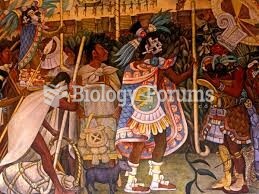|
|
|
It is believed that the Incas used anesthesia. Evidence supports the theory that shamans chewed cocoa leaves and drilled holes into the heads of patients (letting evil spirits escape), spitting into the wounds they made. The mixture of cocaine, saliva, and resin numbed the site enough to allow hours of drilling.
Pubic lice (crabs) are usually spread through sexual contact. You cannot catch them by using a public toilet.
The oldest recorded age was 122. Madame Jeanne Calment was born in France in 1875 and died in 1997. She was a vegetarian and loved olive oil, port wine, and chocolate.
There are 20 feet of blood vessels in each square inch of human skin.
More than 2,500 barbiturates have been synthesized. At the height of their popularity, about 50 were marketed for human use.







